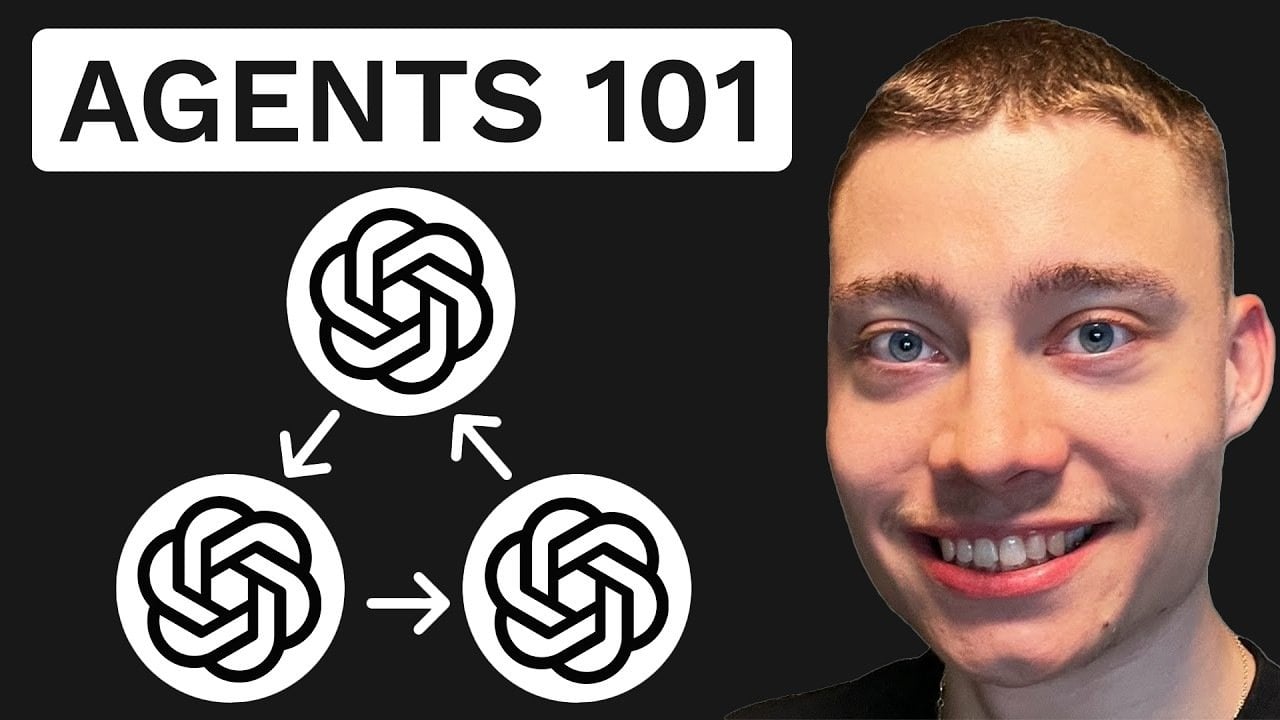Overview of the 2025 AI Agents Course by OpenAI (7 Hours): 15-Minute Summary

Understanding AI Agents and OpenAI’s Course
Artificial Intelligence (AI) agents are systems that can think and act autonomously, handling tasks ranging from scheduling meetings to analyzing intricate datasets without needing constant human supervision. As industries turn to AI for automation and problem-solving, the demand for developers who can build and optimize these agents is escalating. OpenAI’s AI Agents Course 2025 offers a valuable opportunity to learn how to master these systems, taking about seven hours to complete. This structured course presents the necessary tools and frameworks for anyone interested in shaping the future of automation.
Overview of OpenAI’s AI Agents Course
In an overview presented by David Ondrej, the AI Agents Course condenses essential insights on AI agents into a digestible format. It covers the progressive learning path, emphasizing core elements like large language models (LLMs) and best practices for developing AI agents. Here are some key highlights:
- The course teaches a comprehensive framework for building and deploying AI agents.
- It explores foundational components, advanced orchestration techniques, and implementable best practices.
- The course addresses both single-agent systems for simpler tasks and multi-agent configurations for complex workflows.
What Are AI Agents?
AI agents are autonomous systems capable of interpreting information, making decisions, and executing tasks without needing consistent human intervention. Their ability to analyze data and adapt makes them incredibly valuable in various applications, which include:
- Text Summarization: Simplifying lengthy texts into concise summaries.
- Language Translation: Facilitating communication between different languages.
- Email Automation: Managing communication through automated replies and sorting messages.
- Meeting Scheduling: Efficiently organizing calendars and appointments.
These capabilities allow businesses and individuals to streamline operations and improve productivity.
Core Components of AI Agents
To effectively develop AI agents, understanding their core components is crucial. Here are the foundational elements:
- AI Model (LLM): The large language model serves as the reasoning engine, enabling agents to manage complex tasks and adapt to new scenarios.
- External Tools: APIs or functions that enhance the agent’s abilities by providing access to necessary data and actions not available within the agent itself.
- System Prompts: Predefined directions guiding the agent’s behavior, ensuring it operates within specific constraints and meets intended goals.
Grasping these components allows developers to create effective and flexible AI agents capable of various applications.
Structure of OpenAI’s AI Agents Course 2025
The course offers a systematic approach to creating AI agents, starting from single-agent systems and advancing to multi-agent setups. The OpenAI Agents SDK provides a strong framework for integrating tools, establishing guardrails, and managing orchestration.
Single-Agent Systems
Single-agent systems focus on executing tasks independently. These systems are suited for straightforward applications and can gradually be enhanced by adding more tools as needed. This scalability allows developers to concentrate on improving functionality without overwhelming complexity.
Multi-Agent Systems
For more complex operations, multi-agent systems provide flexibility. They typically operate using two orchestration models:
- Manager Setup: A leading agent oversees specialized agents, ensuring efficient task distribution and coordination.
- Decentralized Setup: Agents collaborate as peers, autonomously sharing tasks to meet common goals.
This versatility enables developers to create tailored AI systems that balance complexity with operational efficiency.
Best Practices for Developing AI Agents
The course highlights best practices crucial for the successful development of AI agents:
- Clear Instructions: To avoid confusion, precise directives lead to better execution.
- Task Breakdown: Dividing larger tasks into smaller components can enhance performance.
- Anticipate Edge Cases: Planning for unexpected situations improves the robustness of the system.
- Define Roles: Specialization in tasks increases efficiency and minimizes overlap.
By following these guidelines, developers can create reliable and effective AI agents capable of tackling a wide range of challenges.
Orchestration and Guardrails: Ensuring Reliability
Orchestration
Effective orchestration is vital for managing AI agents. Single-agent systems use various tools for task execution, while multi-agent configurations require careful coordination for efficient collaboration. The OpenAI Agents SDK equips developers with the essential tools needed to manage this effectively.
Guardrails
Implementing guardrails is crucial for ensuring the safety and reliability of AI agents. Key types of guardrails include:
- LLM-Based Guardrails: AI-driven moderation to ensure the generation of appropriate and accurate content.
- Rule-Based Validation: Techniques such as regular expressions or blacklists that maintain data integrity.
- OpenAI Moderation API: This tool enforces safety and compliance with established standards for responsible usage.
Integrating these mechanisms helps mitigate risks and improves the overall reliability of AI systems.
Security, Optimization, and Iterative Development
Security and Optimization
Data privacy and content safety are paramount when deploying AI agents. The course emphasizes refining security measures based on real-world applications, balancing protection and user experience to create secure and user-friendly systems.
Iterative Development
The iterative approach encourages starting small and gradually enhancing capabilities. By making incremental improvements, developers can create scalable systems that adapt to changing needs without adding unnecessary complexity.
Diverse Applications of AI Agents
AI agents have the potential to revolutionize workflows across various industries. By automating repetitive tasks, they enhance efficiency, save time, and reduce errors. The course examines how AI agents can be applied in different contexts, such as:
- Customer Service: Streamlining responses and resolving inquiries.
- Data Analysis: Interpreting large datasets and extracting valuable insights.
- Content Creation: Generating various forms of media on demand.
- Personal Productivity: Effortlessly managing schedules and routine tasks.
By mastering AI agent development and deployment, participants can unlock their full potential, promoting innovation and efficiency in a variety of fields.






